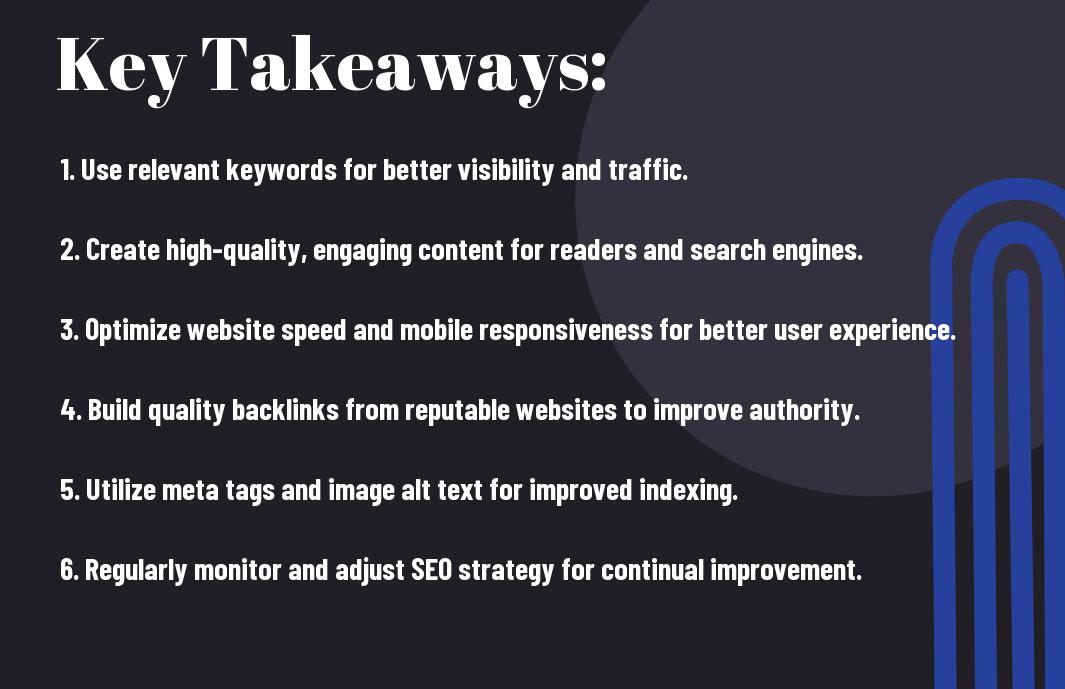Are you struggling to increase the visibility of your website on search engine results pages? Improving your website’s SEO ranking is crucial for driving organic traffic and gaining more online exposure. In this guide, we will cover key strategies and techniques to help you boost your website’s ranking, from optimizing your keywords and content to building high-quality backlinks. By implementing these powerful tactics, you can enhance your website’s search engine performance and attract more potential customers to your business.
Key Takeaways:
- Keywords are key: Conduct thorough keyword research and include relevant keywords in your website content to improve SEO ranking.
- Quality content is crucial: Create high-quality, relevant, and engaging content that provides value to your audience to boost your website’s SEO ranking.
- Optimize your website’s technical aspects: Ensure your website is mobile-friendly, has fast loading speed, and is easily navigable to improve its SEO ranking.
- Build quality backlinks: Secure backlinks from reputable websites to increase your website’s authority and improve its SEO ranking.
- Regularly monitor and update your SEO strategy: Stay informed about the latest SEO trends and update your strategy accordingly to maintain and improve your website’s SEO ranking over time.
 Understanding SEO Fundamentals
Understanding SEO Fundamentals
Obviously, improving your website’s SEO ranking is crucial for driving organic traffic to your site. To achieve this, it’s essential to understand the fundamentals of SEO. You can learn more about improving your SEO ranking from this Improve SEO: 11 Steps to Improve Your Rankings guide.
How Search Engines Work
Search engines like Google use complex algorithms to crawl and index web pages, determining their relevance and ranking in search results. When a user enters a query, the search engine looks for the most relevant pages based on various factors such as keyword usage, content quality, and backlinks. Understanding how search engines work is crucial for optimizing your website to improve its SEO ranking.
The Role of Keywords in SEO
Keywords play a vital role in SEO, as they are the terms that users enter in search queries. Including relevant keywords in your content helps search engines identify the relevance of your website to specific queries. You need to carefully research and strategically use keywords throughout your website to improve its search ranking. The proper use of keywords can make a significant impact on your SEO performance.
On-Page vs. Off-Page SEO
On-page SEO involves optimizing individual web pages to rank higher and earn more relevant traffic in search engines. This includes optimizing content, meta tags, and headings. Off-page SEO refers to activities done outside of your website to impact your rankings within search engine results pages. This includes building backlinks, social media marketing, and influencer outreach. Both on-page and off-page SEO are crucial for improving your website’s SEO ranking.
Understanding these SEO fundamentals will provide you with a strong foundation for improving your website’s SEO ranking. By focusing on the most important factors and understanding the critical role of keywords and on-page vs. off-page SEO, you can take the necessary steps to boost your website’s visibility and drive more organic traffic. Knowing these fundamentals will empower you in your SEO efforts and help you avoid common pitfalls that can hurt your website’s ranking.
Optimizing Website Structure
Unlike other factors that impact your website’s SEO ranking, the structure of your website is something you have complete control over. Optimizing your website’s structure can significantly improve your SEO ranking and user experience. Here are some key factors to consider when optimizing your website’s structure.
For more tips on how to improve your website’s SEO ranking, check out this comprehensive guide on How To Improve SEO Rankings in 2023.
Improving Site Navigation
Ensuring that your website is easy to navigate is crucial for both your users and search engines. A clear and intuitive navigation menu helps your visitors find the information they’re looking for, while also allowing search engine crawlers to easily index your site. Additionally, a well-structured navigation system can help distribute the link equity throughout your site, which can positively impact your SEO ranking.
Mobile Responsiveness and Speed Optimization
Having a mobile-responsive website and optimizing it for speed is essential for improving your SEO ranking. With an increasing number of users accessing websites via mobile devices, search engines prioritize mobile-friendly websites. Additionally, site speed is a crucial ranking factor, as search engines prioritize websites that offer a seamless and fast user experience. Having a mobile-responsive and fast-loading website is not just important, it’s essential for your SEO ranking.
Structured Data and Schema Markup
Implementing structured data and schema markup can provide search engines with additional context about your website’s content, which can lead to enhanced visibility in search results. By adding structured data markup to your website, you can help search engines understand the context of your content, ultimately improving the visibility and relevance of your website in search results. Implementing structured data and schema markup can have a significant positive impact on your SEO ranking.
Content is King
Despite the ever-changing landscape of SEO, one thing has remained constant: content is king. The quality, relevance, and uniqueness of your website’s content play a crucial role in determining its SEO ranking. So, if you want to improve your website’s SEO, focusing on creating high-quality content should be your top priority.
Crafting High-Quality Content
When it comes to improving your website’s SEO ranking, creating high-quality content is essential. This means providing valuable information that is relevant to your target audience. Your content should be well-researched, free from grammatical errors, and should provide a solution to the problems your audience may be facing. By consistently producing high-quality content, you not only attract and engage your audience but also build credibility and authority in your niche.
The Power of Blogging
Blogging is a powerful tool for improving your website’s SEO ranking. By regularly publishing fresh and relevant blog posts, you can keep your website updated with new content, which search engines love. Blogging also allows you to target long-tail keywords, attract backlinks, and showcase your expertise in your industry. Additionally, it provides an opportunity to engage with your audience, encourage social sharing, and drive more traffic to your website.
Utilizing Multimedia Effectively
Integrating multimedia such as images, videos, and infographics into your website’s content can significantly enhance the user experience and improve your SEO ranking. Visual content not only makes your website more engaging and shareable but also helps to break up large blocks of text, making it easier for visitors to consume your content. Furthermore, optimizing multimedia with relevant keywords can also improve your website’s visibility in search results.
Building Authority
Now, one of the most critical factors in improving your website’s SEO ranking is building authority. Search engines value websites that are seen as trustworthy and authoritative in their respective industry. Establishing authority requires a combination of different strategies that contribute to your website’s overall credibility and reputation.
External Link Building Strategies
When it comes to building authority, external link building strategies play a crucial role. Acquiring backlinks from reputable and relevant websites to your content can significantly improve your website’s visibility and credibility. However, it is essential to focus on quality over quantity when it comes to backlinks – low-quality or spammy backlinks can actually hurt your website’s ranking, so be sure to prioritize relevant and authoritative sources when building external links.
Social Media Influence on SEO
Your social media presence can also have a significant impact on your website’s SEO ranking. Engaging with your audience on various social media platforms not only helps drive traffic to your website, but it also signals to search engines that your content is valuable and relevant. Additionally, the social sharing of your content can lead to increased visibility and potential backlinks, further improving your authority and SEO ranking.
Managing Your Online Reputation
Your online reputation is another crucial aspect of building authority and improving your website’s SEO ranking. Positive reviews and feedback from customers or clients can enhance your credibility and trustworthiness in the eyes of both search engines and potential visitors. It is essential to actively monitor and manage your online reputation to ensure that any negative feedback or reviews are addressed promptly and appropriately.
Tracking Progress and Staying Updated
Keep a close eye on your website’s SEO progress by regularly tracking your search engine rankings and monitoring the performance of your keywords. It’s important to stay updated on the latest SEO trends and algorithm changes to ensure that your website stays ahead of the curve. You can stay informed by following reputable SEO blogs, subscribing to industry newsletters, and participating in online forums like Quora’s discussion on how to quickly improve website’s SEO rankings. This will help you stay informed about best practices and new strategies that can help improve your website’s SEO ranking.
Essential SEO Tools and Metrics
One of the most essential aspects of tracking your website’s SEO progress is using the right tools and metrics. By using tools such as Google Analytics, Google Search Console, and SEMrush, you can gain insights into your website’s traffic, keyword performance, and overall SEO health. Monitoring these metrics will help you identify areas for improvement and make data-driven decisions to optimize your website for search engines.
Adapting to Algorithm Updates
Search engine algorithms are constantly evolving, and staying ahead of these updates is crucial for maintaining and improving your website’s SEO ranking. When major algorithm updates occur, it’s important to adapt your SEO strategy accordingly. Keep an eye on industry news and stay informed about any changes in search engine algorithms. This will help you anticipate any potential negative impacts on your website’s ranking and make necessary adjustments to maintain or improve your SEO performance.

The Importance of Improving Your Website’s SEO Ranking
The key to improving your website’s SEO ranking is to consistently produce high-quality, relevant content and optimize your site’s structure and performance. By focusing on keyword research, building backlinks, and improving user experience, you can boost your website’s visibility and attract more organic traffic. Utilizing SEO best practices will not only improve your search engine rankings but also enhance the overall user experience on your site. To stay ahead in the competitive digital landscape, it’s crucial to continue monitoring and adapting your SEO strategy to align with the latest trends and algorithms. By implementing these tactics, you can elevate your website’s SEO ranking and increase your online presence.
FAQ
Q: What is SEO?
A: SEO stands for Search Engine Optimization. It is the process of optimizing your website to improve its visibility on search engine results pages, ultimately driving organic traffic to your site.
Q: Why is SEO important for my website?
A: SEO is important because it helps search engines understand what your website is about and whether it is relevant to a user’s search query. By improving your SEO ranking, you increase the chances of your website being found by potential customers.
Q: How can I improve my website’s SEO ranking?
A: To improve your website’s SEO ranking, you can start by conducting keyword research and using relevant keywords in your website content. Additionally, optimizing your website’s meta tags, creating high-quality content, and obtaining backlinks from reputable websites can also improve your SEO ranking.
Q: How long does it take to see results from SEO efforts?
A: The time it takes to see results from SEO efforts can vary depending on the competitiveness of your industry and the specific strategies implemented. Generally, it can take several months to see significant improvements in your website’s SEO ranking.
Q: Can I improve my website’s SEO ranking on my own, or do I need to hire a professional?
A: While it is possible to improve your website’s SEO ranking on your own, hiring a professional with expertise in SEO can often lead to more effective and efficient results. SEO professionals have the knowledge and experience to implement proven strategies and stay updated with the latest trends in the industry.
